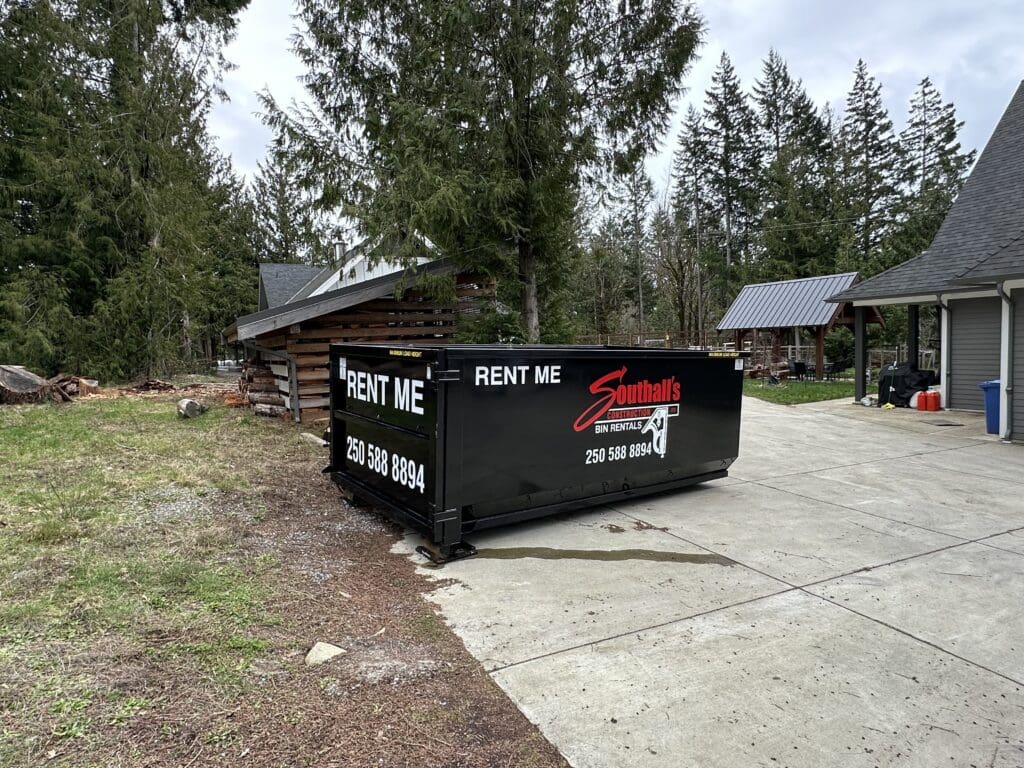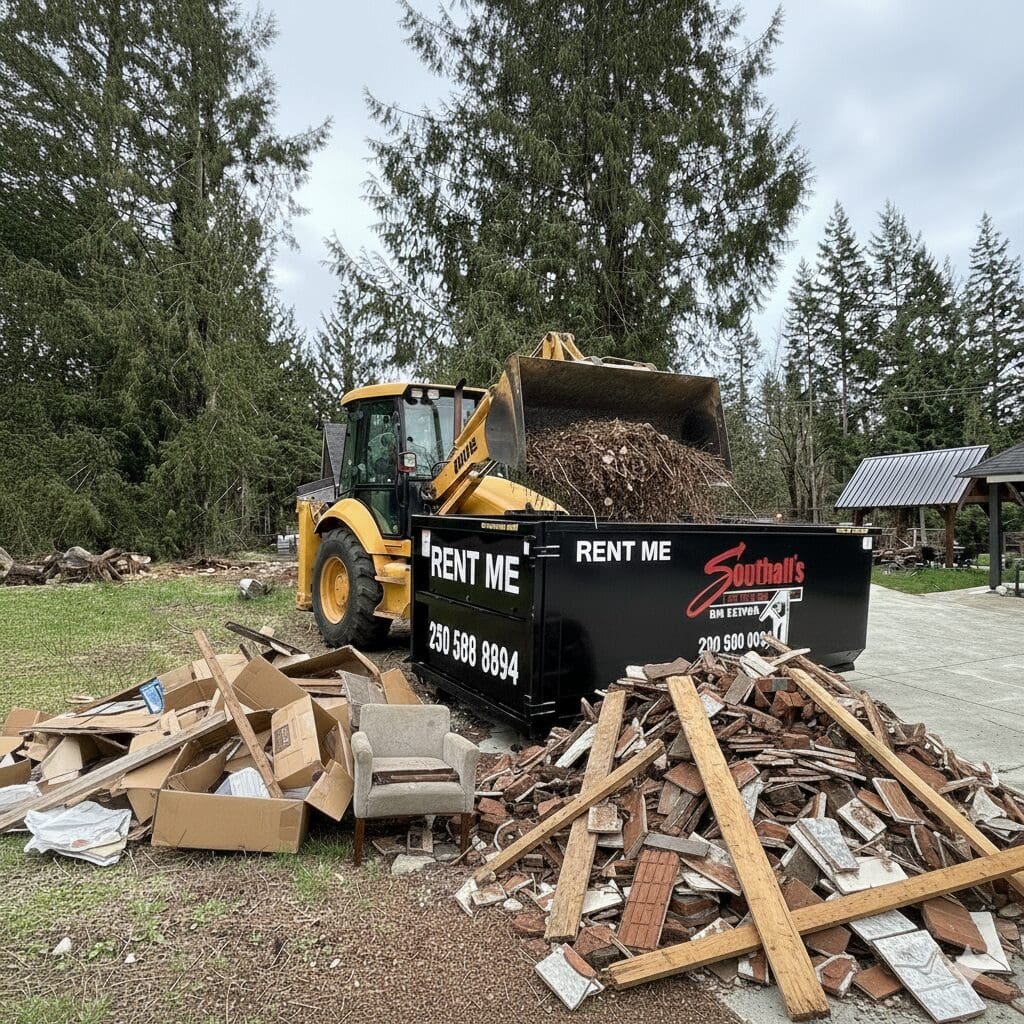
Renting a disposal bin is one of the easiest ways to manage waste from renovations, landscaping, or general cleanups. However, knowing exactly what can and can’t go into a rental bin is essential. British Columbia has clear environmental regulations governing waste disposal, and understanding them helps homeowners and contractors avoid fines, reduce landfill use, and protect the local environment.
The information below outlines the acceptable materials, those that require special handling, and how responsible waste management supports communities across the Cowichan Valley.
Proper waste sorting isn’t just a matter of convenience—it’s the law. In British Columbia, waste management facilities and private bin providers must comply with provincial and municipal regulations that govern the handling of materials. Improper disposal of certain materials can lead to fines, safety hazards, or environmental damage. Sorting waste correctly keeps hazardous substances out of landfills and local water systems, allows recyclable materials to reach the right facilities, and helps keep landfill and tipping fees affordable for everyone. It also ensures contractors and homeowners stay compliant with environmental standards.
Understanding and following these rules benefits the entire community. When materials are separated properly, they can be reused or recycled more efficiently, reducing the strain on landfills and conserving natural resources. Over time, responsible sorting practices help create cleaner neighbourhoods and protect the Cowichan Valley’s natural environment.
📌 Quick Insight:
Did you know? Some materials banned from landfills include electronics, batteries, oil, and drywall containing asbestos.
When renting a bin from a professional provider, most common household and renovation debris is allowed. These materials are safe for transport and meet provincial waste standards.
Typical household junk and non-hazardous materials can be safely disposed of in a bin:
For outdoor projects, these materials are acceptable:
Pro Tip:
To save space and reduce costs, sort yard waste separately. Organic loads are often cheaper to dispose of at green waste facilities.

Certain materials are strictly prohibited under BC waste regulations. These items must be handled separately through municipal recycling programs or licensed hazardous waste depots.
Never dispose of the following in a rental bin:
These substances pose a serious risk to workers and the environment. Instead, take them to an Eco-Depot or hazardous waste collection site in your area.
Electronics contain components that must be recycled through approved e-waste programs. Avoid placing:
Some construction materials require special disposal:
Important Reminder:
When in doubt, ask your bin rental provider. Material types are usually confirmed before drop-off to ensure compliance and prevent costly reloading fees.
The Cowichan Valley Regional District (CVRD) enforces local waste sorting rules. Most disposal bins are emptied at regional transfer stations where materials are sorted, weighed, and either diverted to recycling or sent to a landfill.
Bin drop-off: The bin is placed at your site, with boards provided to protect the driveway from damage to pavement or landscaping. Delivery drivers typically position bins in an accessible yet out-of-the-way location to ensure efficient, safe loading.
Filling: Load acceptable materials according to weight and fill guidelines. It’s best to distribute heavy materials evenly to maintain balance during pickup. Avoid mixing prohibited waste with general debris to prevent extra sorting fees.
Pick-up & transport: Once full, the bin is collected and secured for transport to a CVRD-approved facility. Drivers ensure that bins are covered to prevent debris loss and that all safety protocols are followed on the road
Sorting & tipping: At the facility, the load is weighed and sorted. Recyclables such as metal, wood, and concrete are separated and sent to processing centres, while non-recyclable materials are disposed of at regulated landfill sites. Landfill items incur tipping fees, which are based on weight and material type.
This process ensures environmental compliance and cost efficiency for every customer.
Did you know?
CVRD transfer stations divert thousands of tonnes of recyclables and organics each year—reducing landfill waste and supporting sustainability.
Planning and loading your rental bin correctly can make waste removal safer, more efficient, and more cost-effective. Before filling the bin, organize your materials into groups such as wood, concrete, and yard waste. Sorting beforehand simplifies recycling and ensures each type of material is processed appropriately. Always remain aware of the fill line; overloading bins can make them unsafe to transport and may lead to additional fees at disposal facilities.
It’s also important to clarify which materials are restricted before starting your project. A quick confirmation with your rental provider can prevent unnecessary re-sorting and extra costs. Selecting the right bin size from the outset is another key consideration. Smaller bins, such as 10- or 12-yard options, work well for residential cleanups, while larger construction or demolition projects often require 20-yard bins. Avoid placing dense materials, such as dirt or concrete, into large bins, as this can exceed safe weight limits. Using smaller bins for heavy loads helps ensure proper handling and safe transport.
Pro Tip:
Avoid placing heavy materials, such as concrete or dirt, in large bins. Use smaller bins to stay within weight limits.
Local bin rental providers across the Cowichan Valley adhere to strict environmental standards to ensure materials are managed responsibly. This commitment focuses on diverting recyclables and green waste to approved facilities, preventing landfill overflows through proper sorting, and maintaining transparency about how disposal fees support ethical practices. By following regional recycling guidelines, these providers help reduce the environmental impact of construction, renovation, and household waste.
Environmental responsibility also involves educating residents and contractors about what can and cannot be placed in rental bins. When users understand how to correctly separate waste, recyclable and organic materials can be processed efficiently, minimizing contamination and supporting sustainability goals. Collaboration with regional recycling centres and compliance with the Cowichan Valley Regional District (CVRD) and provincial standards ensure that every load is handled safely, contributing to a cleaner, more sustainable community.
Understanding what you can and can’t place in a rental bin helps save money, protect the environment, and maintain compliance with local regulations. Whether clearing a yard, renovating a home, or managing a construction site, choosing responsible waste handling ensures that materials are disposed of properly.
Taking the time to understand local recycling programs, facility rules, and material restrictions also helps residents and businesses make informed choices that strengthen long-term sustainability efforts across the Cowichan Valley.
Yes, as long as it doesn’t contain asbestos or mould. Older drywall should be tested if there’s uncertainty.
Bins must not exceed the top fill line. Overfilled bins may be unsafe to transport and could incur additional fees.
The disposal site may refuse the load or charge a contamination fee. Always check the accepted materials list before filling.
It’s best to keep them separate. Mixed loads often incur higher processing costs and can impact recycling efficiency.
Take them to your nearest CVRD Eco-Depot or municipal hazardous waste facility. These centres handle materials safely and ensure compliance with environmental regulations.
